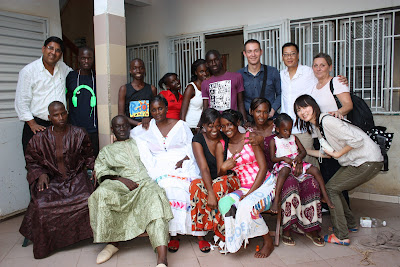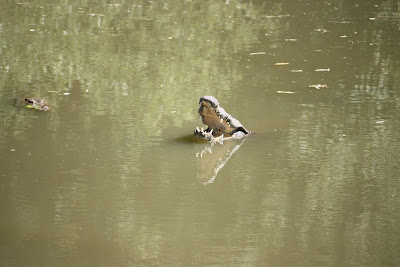Here's my Top 10 list:
- Clean tap water - Brushing your teeth with bottled water seems pretty opulent, but it's a real pain. It's necessary here because the tap water is unsafe to ingest. Similarly we have been advised to avoid ice cubes in our drinks or eating uncooked vegetables and unpeeled fruits, since they would have been made or rinsed with the unsafe tap water.
- Running water - Clean or not, not having running water can be quite an inconvenience. While in Dakar this past weekend, there was no running water in the city for most of the day. Toilets don't flush and you can't wash your hands. Have you ever tried rinsing all the soap suds off your hands with bottled water? It really makes you realize how much water we go through. Dripping with sweat in temperatures ranging between 30°C and 34°C during the day while walking the filthy garbage-filled streets, can you imagine not being able to take a shower before going to bed? That almost happened, but fortunately the water was turned back on late Saturday evening. Still, the water pressure had not built up fully until Sunday morning, and it would take time for the water heaters to fill up and heat the water...
- Hot showers - (see above)
- Electricity - Senegal is in an energy crisis. They burn fuel to produce electricity, and we all know how much it costs nowadays to put gas in our cars. Power outages are common here and we've experienced a good number of them. There is no worse feeling than when the lights go out and your laptop beeps before it switches to battery power. Moreover, only the larger cities are on the grid. This past week we visited the Pink Lake, and the generators at the restaurant there only store enough power to allow the restaurant to operate during lunch! And I learned that in the villages, there is no electricity at all. What would you do with a dead cellphone? Villagers here go into the city once a week, just to charge their phones!
- 60W light bulbs - Last weekend in Saly my hotel room lights didn't even work but fortunately I had a dim light operational in the bathroom (woo... hoo....). Even where there are adequate light fixtures like the office where our team works, or in our hotel rooms, you'd be hard pressed to find a light bulb brighter than 40W. On the positive side, you can't see the bugs in your food or realize how dirty your hotel room is.
- High speed internet - Orange (French telco) is the DSL service provider for our host organization's office. Not even very fast, last Friday, the DSL went down around 10:30 a.m. When we left the office at 6 p.m. it was still down. What's more surprising is that no one seemed to notice except for the IBM consultants upstairs! We can so easily take for granted the instantaneous access to information we have. Think about that the next time you need to map a location in your car, "babysit" your child with Netflix, or Google a thought as soon as it crosses your mind.
- Toilet paper - In Senegal, you rinse with water not wipe with toilet paper. Unfortunately on our weekend visit to Île de Gorée (Gorée Island), which for nearly 4 centuries was a gateway for the Atlantic slave trade, I found myself in more traditional settings. Sometimes when nature calls, it screams. Walking through town, a nice woman and her daughter were kind enough to allow me to use their bathroom. Luckily I was able to acquire some tissues from corner store next door. We weren't so lucky at the restaurant earlier.
- Smog checks - This past year my annual vehicle registration required another smog check and I was annoyed. Not anymore. Here in Senegal, nobody maintains their vehicles, and cars, buses and trucks zip down the street spewing black soot. Several of the IBMers here have developed bad allergies due to the poor air quality. Just how bad is it? It's so bad, that when I scrub my tongue every night, it's black.
- Landfill sites - Every week we take out the trash, unless you're my wife. :) We don't think twice about where it ends up unless of course you live downwind of the dump. Here in Senegal, there is no dump. There aren't even any garbage cans. The whole city is literally a dump. There is trash everywhere, and when it accumulates into a big enough pile, people just burn it, and the smell is sickening.
- Customer service - In our world of instant gratification, we expect things immediately. That doesn't happen here in Senegal, where a dinner can take over 2 hours - and ironically that's even at restaurants that call themselves "restaurant rapide" or fast food!!! You must wait to take your order, you must wait for your drinks to come, you must wait for your food to come, and you must wait to get your bill (which too frequently is incorrect). That agonizing wait between your drinks and food can be endless. For instance, this afternoon in Dakar, at a 5-star Radisson nonetheless, we waited over an hour between our starters and our main dish. And that's even after complaining three times! Sadly the reality is that generally workers simply don't care - they listen blindly and go about what they were doing before. So back home, don't forget to tip your servers and quit complaining if you're put on hold for a few minutes!!!
The postings on this site are my own and don't necessarily represent IBM's positions, strategies or opinions.










































